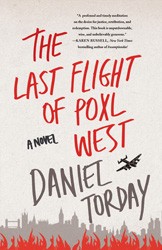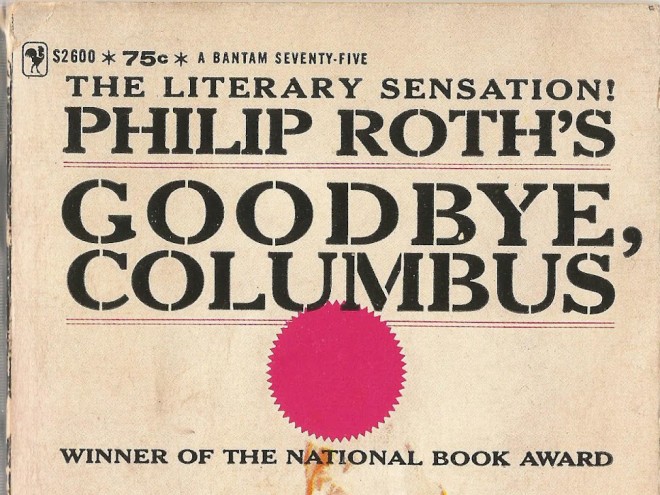In his ambitious and moving first novel, Daniel Torday (whose novella The Sensualist won the 2012 National Jewish Book Award for Debut Fiction) sets two Jewish stories in rich contrapuntal relation. The first is told by an adult Eli Goldstein, looking back on his teenage self, coming of age in the Boston suburbs of the 1980s on the threshold of Jewish consciousness, and how he learned about the tragic story of Jewish life in Eastern Europe during World War II. That fraught narrative is told by his beloved Uncle Poxl, in a best-selling memoir, about his experience during the War as an émigré pilot for the British Royal Air Force, flying bombing missions over Nazi Germany.
The novel shifts between Eli’s youthful encounters with his charismatic uncle, whose story resonates for the nephew with the authority of Jewish history and memory, and long sections of Poxl’s actual “narrative,” which upon publication made him an overnight literary sensation. While Poxl is reviewed everywhere and celebrated as a newly discovered Jewish witness to the War in the tradition of Primo Levi and Elie Wiesel, the proud nephew waits for his signed copy. Unaccountably, the longed-for volume never arrives. There is, it turns out, something mysterious about Uncle Poxl. Torday’s achievement is to make the enigmatic, unforgettable Uncle and his fascinating war story come alive.
In Torday’s vivid portrait, Uncle Poxl emerges as a character akin to one of Bellow’s zany yet deeply serious “reality instructors,” like Dr. Tamkin in Seize the Day (1956), a luftmensch (literally, in this case Poxl is indeed an “air-man”) appearing and disappearing out of nowhere: “Uncle Poxl had one of those pointy red Ashkenazi faces whose very shape carries confidence and import. The bridge of his nose was so thin it simply faded into his high red brow. Atop his head he wore a trademark porkpie hat, the brown felt of which was always brushed.”
Poxl instructs his receptive nephew (he calls Eli his “constant listener”) in how to appreciate high culture in all its forms and modes, as well as to relish ice cream sundaes from Cabot’s creamery. Above all, he teaches his nephew through his own life story. As a teenager at the threshold of the War and the deportation of the Jews, Poxl escaped from his native Prague and ended up in London, where he joined the RAF and flew bombing missions over Germany. In this way Poxl enacts a form of Jewish revenge on the Nazis. In the process we’re told that Poxl “had wrested his fate from the inevitable bearing down of history.” Thus Uncle Poxl embodies Jewish memory itself; his “war story” seeps into Eli’s searching Jewish soul. “It was as if he was crafting his great account before my eyes,” an older Eli reflects later, “and I don’t know that I’ve been so close to history since.”
The longer and more riveting sections of Torday’s novel are presented as Poxl’s own youthful and later adult wartime memoirs, which recount his journey East to West, through Rotterdam and eventually to London. For all its evocation of world-shaking events — which include a rendering of the saturated Nazi bombing of London and vivid accounts of RAF flights over Germany — Poxl’s personal narrative remains, ultimately, an intimate story of erotic awakening, betrayal, and flight — Poxl’s habit, nourished by centuries of Jewish experience, of self-exile.
Poxl’s first betrayal involves his beautiful red-haired mother, who, we learn, posed naked for the sexually provocative Austrian artist Egon Schiele (here Torday’s attempt to account for Poxl’s psycho-sexual pathology seems a bit far-fetched); the traumatic discovery of his mother and Schiele — more or less imitating one of his now-famous explicit drawings in the flesh — marks the young Poxl with filial trauma.
Only by the end of Poxl’s memoir, which is also the end of The Last Flight of Poxl West, do we understand that Poxl’s memoir is, ultimately, a love story set against and shaped by personal and historical trauma. In a moving concluding image, Poxl seeks redemption with a former lover who is herself scarred — literally — by history. Only through such a loving act, it seems, can Poxl begin to soothe the scars of Jewish experience, salve the bodily traumas inflicted by race hatred. Indeed, this loving gesture turns out to be Uncle Poxl’s legacy, as a survivor, both for his faith-keeping nephew, and for us, his constant, attentive readers, absorbed by his amazing story.
Donald Weber writes about Jewish American literature and popular culture. He divides his time between Brooklyn and Mohegan Lake, NY.





